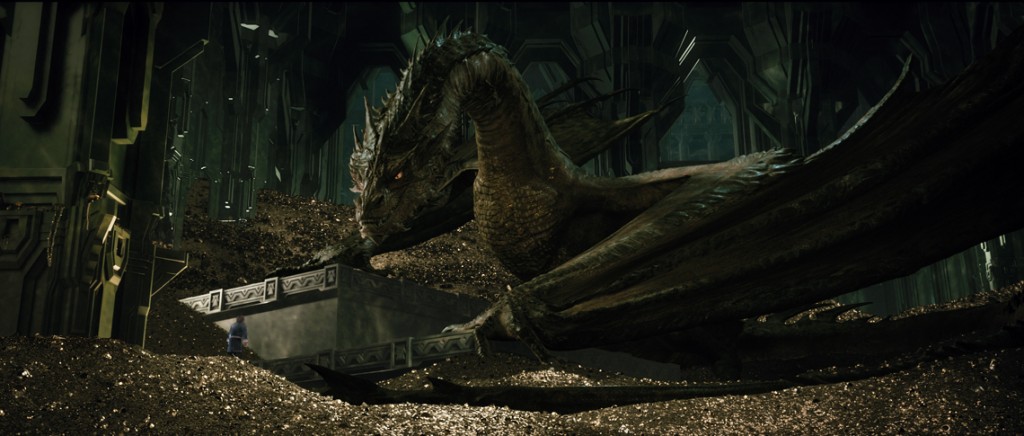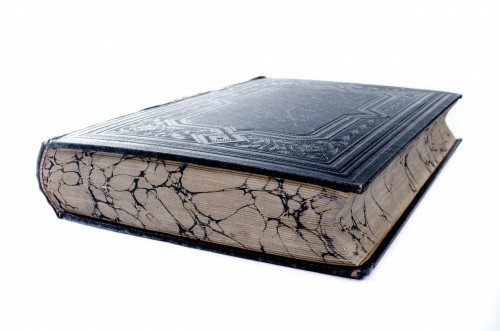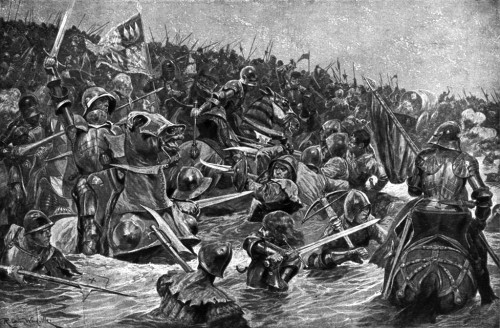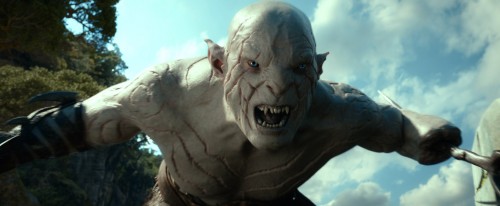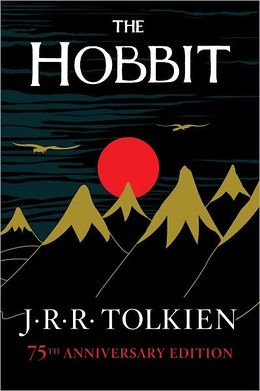I saw all the Hobbit films in the theater, and while I’m not the biggest fan of the book, I find I’m watching bits and pieces of the movies here and there as I flip through the channels again and again. Some more than others. However, there is one scene that I must turn to and watch in its entirety every opportunity I get:
Smaug.
Smaug slowly reveals himself from under a treasure trove that would invoke Dragon Sickness on Thorin. Smaug talking with Bilbo, toying with him, showing him exactly how impressive he might be. And the extremes he goes to prove that the dwarves will never retake the mountain.
I love every minute of it.
Yet, the other night I was watching these sequences and a strange thought popped into my head:
Why does Smaug (or any dragon) need all that gold? And it isn’t just him – so many of these creatures throughout our myths are guarding a treasure horde. It is a staple such that in Dungeons and Dragons it is not questioned. The only questions anyone has any real concern to answer are: how much is the horde worth? Are we powerful enough to kill the beast guarding it?
But I feel like there is more to this idea.
***
So What’s He Going To Buy With All That Gold?
***
The cavern shone whenever the tiniest glint of light broke through. In those instances, the gleam would bounce from coin to coin, making them sparkle. It would illuminate the lighter colored gems so they became tiny lanterns dotting the golden mound. Under this light the true spectacle could be seen. Appreciated. Gold and diamonds and coins and gems and… a myriad of skeletal forms cooked to a crisp inside their metal armor.
That same treasure acted as a beacon to some. Bands of adventurers who wove odd stories about how the dragon claimed their birthrights… their home. How every coin buried there was theirs to recover. Indeed, all of it would be restored to its rightful owners.
Yes, the cavern might have once belonged to dwarves or mountain men or even an orc herd, but it was the dragon’s now and had been for decades. It was his home. And more importantly, so were the riches it used as a bed.
For while the previous owners certainly contributed to its girth, not everything was from a singular conquest.
***
Krench moved into the cavern. Ever a creature of habit, he made sure to bring along a lantern, even if the act was worthless. At the outer chamber a familiar warmth ran down his leg. Long gone were the days he might have made excuses for such an action. How it could have been explained away as an involuntary response to the immense fear coursing throughout his body.
If his nephew smelled the urine, he did not show it. For that, Krench was grateful. There was far too much left to teach the lowly creature for them to become bogged down in such a trivial thing.
“The thing that no one understands is exactly what the Great Wyrm does with all his riches. The outsiders believe he simply slumbers on them. They make up superstitions where he extracts some form of nourishment from the metals in the coin allowing him to generate his awesome flame. They suppose he is vain and loves the way the gold and silver flicker in the darkness.
“Does that even make any kind of sense? It is up there with those who claim he stole the entire amount.
“Lies! And I have the numbers to prove it.” Krench patted the large book tucked under other arm. “A quick reading of this would inform everyone that of his original horde, only thirty percent was from what the dwarves possessed. Then there was the twenty-five percent in tribute from the lizard men. Another ten percent from random caravans he assaulted when bored. The last thirty-five percent an investment with the orcs that paid him quite well upon their successful campaign against the elves.”
The tunnel tightened enough that they both were forced to duck. His nephew passed through the narrow opening first and took the lantern and book from him while he made his way. Holding the items, the younglings resembled him decades earlier. His mind would be a swirl, a jumble mass of expectations, questions, theories, and who knows what else. To his credit, no questions were posed, but Ketch knew the sermon was far from finished. There was just too much to prepare him for. To explain how the world really worked.
“Once a week the Dragon’s Accountant must journey here to give a full account on all his holdings.” That got the boy’s attention. “I know your question: how would his horde ever change? He’s sleeping on the lot of it.
“And that’s the secret. He’s not. That’s small level thinking. For a creature such as this, who counts his life in decades or even centuries, you must expand on all of that. And this one has holdings as far east as Silverpool, as far north as the great seas… where ever money might exchange hands the likelihood is very high some of the coin originated here.”
“That inn located at the crossroads of Madras and Danan. Where all the caravans stop. Where lords and ladies and even princes have stayed… he owns a fifty percent stake. The blacksmith shop in Butte has worked out a nice living for himself because of a certain anonymous investor.
“A fleet of ships supporting the Merchant Guild in Silverpool.
“And the latest Duke of Parthan, who somehow found enough of a foreign inheritance to afford the new title and the lands which come with it.”
Krench let it all sink in.Watching his nephew’s eyes dart back and forth, a mind at work. After a few moments, a toothy grin emerged.
“Not to mention the coinage itself. Think about it, most of the coinage will be old. Then after a time it will be very old. Then ancient. Kingdoms and empires rise and fall in the blink of an eye (well, from His point of view). They mint new coins, phase out the old ones… and no one wants to have worthless coins. So periodic exchanges have to occur. In small enough amounts not to arouse suspicion, but in enough transactions so that you actually gain some ability to pay for what you want to invest in.”
The first of the outer doors appeared at the end of the tunnel. Remnants of the previous owners. A loose stone along the right side of the door, halfway down, provided the opening mechanism. Krench pushed until he heard the click and the engraved doors shifted open.
“What people don’t understand is dragons are ancient creatures. On a long enough timeline, barring random adventurers stumbling in and murdering them in their homes, they might well live forever. Even the ancient elves appear to wither in the eyes of dragons.
“But forever is a long time. And while they may share more in common with cats in their sleeping habits- they still wish to be entertained. And with the level of money they possess… well, pulling the strings on some of the humanoid peoples is a pleasant distraction.
“More than anything else, he knows history will repeat itself if you let it. So he can push and pull. Nudge things along for the better. Well, for his better.
“You see, dragons have gotten a horrible reputation as being evil. But what no one will tell you is the word is made up. They simply don’t realize have the perspective to appreciate everything as it moves and twists and turns. The elves… yes, they might, but the lower races, the dwarves and humans and halflings and gnomes and orcs… the lot of them just don’t live long enough. So they make up new stories to explain the world around them. And more often than not they only have the vaguest of memories as to what came before. The devastation, the wars, the armies… evil.”
They were getting lower now, the tunnel’s slope increased to the point Krench had to hand the lantern over to his nephew. They both stumbled a bit, but neither lost their footing. A hundred feet or so later things flattened out once more, and he took the burden back.
“Of course, they don’t know about the art. Creatives need funding as well. Ancient dragons need songs and maybe stories to be written about them. To be retold for the next generation. And who’s going to pay those bards to make such beautiful art? He is.
“Exotic animals? Seems strange, but my father explained it to me. Some days you want beef and some days you want Minotaur. Nothing wrong with either. And when you exist at the top of the food chain and have this level of wealth…”
“My great-grandfather realized one undeniable truth: wars cost money. Conquests. Paying armies to conquer the world. It’s a terrible business plan. First you outlay all of that money on the mercenaries. You pay to feed them. To forge weapons for them. To build the forges. To build the siege equipment. And all of that work and gold guarantees absolutely nothing.
“Up to that revelation, the Dragon’s Accountant merely handed out the sacks of gold to the mercenaries and kept a log of it all in the book. But it was a drain on the coffers, and no amount of caravans would cover the loss. That pile he sleeps on will surely drain until he’s sleeping on stone like some commoner. No! That would not stand! So he dared to pose a single idea: if the Great Wyrm really wished to take over the kingdom, then why not buy it instead?”
Careful to turn the key two times to the left and then once to the right (no one wanted a face sprayed with acid from a trap set to keep the undesirables out), Krench led them into the cavern proper. Pausing to let the younger of them take the sight in, he pushed his spectacles back up his long snout. Long ago the glitter was enough to nearly blind him. Too many restless nights were spent trying to determine exactly how one might extract such a mass from the mountain. When his own father passed the Book onto him, he spent more than enough time to understand how moving even one coin was as important as the whole of it.
Later, when he took a full account of the book, Krench realized some of the investments had gone sideways. A small war between human kingdoms, a great flood, and suddenly there was a loss to report for the fifth year in a row. Such a glorious day filled with fire to signify the passing of duties to the next Accountant.
“Krench…” The Great Wyrm stretched out his name so that it appeared to come from everywhere and nowhere all at once.
The two of them moved over to the large platform where he would deliver the latest news. As they climbed the steps, crafted so long ago by rough dwarvish hands, he pushed the book into his nephew’s arms. There was no need for it anymore.
Dragons were patient creatures, but above everything else they did not like to lose money.






